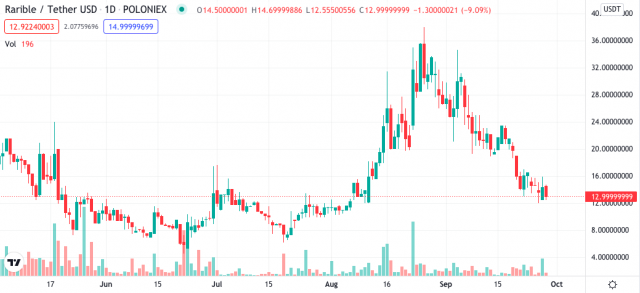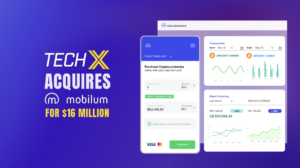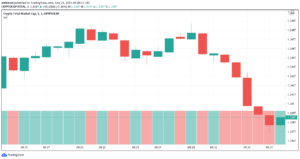NFTs have been on a tear this year. Last month, the market saw record highs and markets like OpenSea have been experiencing unprecedented volume. The perpetual question surrounding nearly every aspect of crypto is… “so where do we go next?” Many believe that audio NFTs could be a largely untapped area to date.
While “collecting JPEGs” has been a meme in and of itself, there’s little question that there is truly a use case and value-add for a wide variety of markets with NFTs. So… where does the market go next? Some of the strongest NFT projects have been about building an identity and community.
Projects like Bored Ape Yacht Club have created a digital atmosphere of community, exclusivity, and fun. Some projects have built unique use case, like Axie Infinity, where online economies can add value across the globe. Finally, there’s some projects that are looking to take traditional molds and flip them upside down. The entertainment industry, with the music business in particular, is ripe for revitalization.
Music To Our Ears
We’ve now found ourselves in new, uncharted territories as crypto begins to infiltrate a variety of industries and their daily operations. The music business has constantly been evolving, often exercising a push and pull between artists, labels, streaming services, and listeners.
There have been a few meteoric shifts over the last few decades, with the power dynamics shifting from recording label dominance, to independent promotion, and now to digital streaming services. Through it all, the industry has operated to a large degree on copy and paste deal structures, resulting in often manipulative deals for creatives. NFTs show the potential to change that – and more.
With the influx of NFTs and cryptocurrencies, there may be a path forward for artists to become more involved with the money making aspects of art and music. Quite often the artist simply relies on management or recording labels to handle distribution, promotion, and booking. NFTs serve as a tool that can impact artist’s merchandise, live performance tickets, live recordings, and general interaction with fans.
Related Reading | How This Crypto Trading Hamster Is Outperforming You
Status Check? Where We’re At
Audio NFTs undoubtedly have immense potential. Andreessen Horowitz crypto investor Chris Dixon describes that potential in a recent tweet, stating that “music is going to be an amazing category for NFTs. It’s where the gap between fan enthusiasm and creator monetization might be the widest.”
Dixon made the comment while quote-tweeting entrepreneur Suhail Doshi’s new platform “Songs for Tunes.” However, the challenges here are common threads for many of these emerging audio-first NFT projects. Scalability, adaptability, and getting the first wave of consumer loyalists on-board.
Furthermore, “audio NFTs” might even just be too much of a generalization, given the fragmentation of NFT types that we’ve seen succeed thus far. One culture and crypto investor, Magdalena Kala, called out over a dozen unique NFT types in a recent tweet. The reality is that audio NFTs have the potential to blur many of these lines. NFTs from musicians, for example, could include fan packages that serve as defacto subscriptions, or they could utilize exclusive event admission through an NFT, or they could be donating proceeds to a charity that they prefer. Additionally, some artists like 3LAU, are looking to create their own entire NFT marketplace.

NFT platform Rarible recently introduced it's RARI token, rewarded to holders on the platform. | Source: RARI-USDT on TradingView.com
Some of the biggest platforms hosting NFTs thus far, such as OpenSea, Rarible, NiftyGateway, and SuperRare, are already supporting audio NFT files. However, audio-first platforms are continuing to emerge, notably spurred by platforms such as Catalog and Audius. The lack of consolidation is representative of the early stages of NFTs in general, and especially audio NFTs. This adds to confusion for consumers who could’ve already been trying nail down the foundational info.
Many potential consumers are already asking: “What does purchasing an NFT look like? What EXACTLY am I buying? Will I own a piece of music? Will I own distribution rights? How does this affect copyright laws relating to my purchase?” The answers are often that we are simply figuring many of these things out as we go.
It’s Not Over ‘Til…
In all, exclusivity and community have been two traits linked to a large amount of successful NFT projects to date, and are two traits that generally net positive results in the music business as well. NFTs have the potential to impact artist’s merchandise, ticketing, new music releases, and live recordings in a whole new way – without even getting into artist compensation.
Where do we go from here? As audio NFT platforms evolve, there is limitless potential as to what an audio NFT, and platform, can actually be. Only time will tell, but we’d like to think that Web3.0 will bring a redefining perspective around the playground that audio NFT creators can play in, and the way that artists interact with fans. Fingers crossed.
Related Reading | Dapper Labs Set To Announce NFL Partnership
Featured image from Pexels, Charts from TradingView.com
- "
- All
- AREA
- around
- Art
- artist
- Artists
- audio
- Biggest
- Building
- business
- Buying
- change
- Charity
- Charts
- club
- Common
- community
- Compensation
- confusion
- consolidation
- consumer
- Consumers
- copyright
- creator
- crypto
- crypto trading
- cryptocurrencies
- Culture
- deal
- Deals
- digital
- dozen
- Early
- Entertainment
- Entrepreneur
- Event
- Exclusive
- Finally
- First
- For Consumers
- Forward
- fun
- gap
- General
- here
- How
- HTTPS
- Identity
- image
- Impact
- industries
- industry
- info
- interaction
- investor
- involved
- IT
- Labels
- Labs
- large
- Laws
- Making
- management
- Market
- Markets
- meme
- money
- Music
- musicians
- net
- NFL
- NFT
- NFT platforms
- NFT projects
- NFTs
- online
- Operations
- performance
- perspective
- platform
- Platforms
- power
- projects
- promotion
- purchase
- Reading
- Reality
- Releases
- Results
- Scalability
- Services
- set
- streaming
- streaming services
- successful
- time
- token
- Trading
- value
- volume
- Wave
- Web3
- WHO
- year













